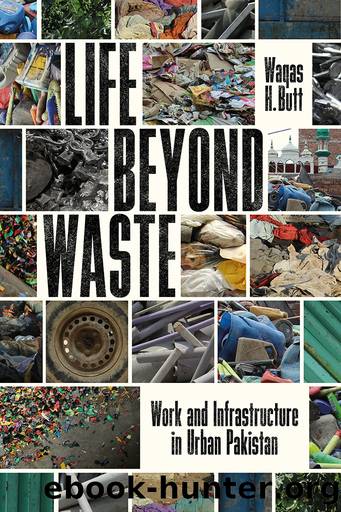Life Beyond Waste by Waqas Butt;

Author:Waqas Butt;
Language: eng
Format: epub
Publisher: Stanford University Press
Published: 2023-06-15T00:00:00+00:00
Intimacy is a projected and condensed social relation that expresses certain interdependencies and ambivalences.3 For instance, Lauren Berlant (1998, 282) describes an intimacy that âbuilds worlds; it creates spaces and usurps places meant for other kinds of relation. Its potential failure to stabilize closeness always haunts its persistent activity, making the very attachments deemed to buttress âa lifeâ seem in a state of constant if latent vulnerabilityâ (see also Berlant 2011). Similarly, Michael Herzfeld (2005, 3) calls attention to what he describes as cultural intimacy, in which certain facets of a âcultural identityâ become at once âa source of external embarrassmentâ and an âassurance of common sociality.â4 These approaches have prioritized intimacy as a relation of familiarity and closeness rendered unstable because of something external. Yet it becomes evident that intimacies are consistently marked by ambivalences when one considers that intimate relations are suffused with a wide range of affectsâfrom love, care, and sympathy to disgust, shame, and powerlessness (Herzfeld 2005; Kristeva 1982; Berlant 2011; see also Ali 2021; Rashid 2020). In fact, the ambivalences involved in intimacy are key modalities through which actors across the lines of caste, class, and religion relate to the unevenness of life in urban Pakistan. This vision of intimacy underscores such ambivalences because they provide insight into an unevenness internal to intimacyâs constitution.
Waste work is a prominent social activity in which persons and bodies potentially come into close proximity, touching the same objects as they move in a sequential way, from the object (i.e., commodity) used up and discarded as a waste product to its collection and exchange, which will remake the object into something of use once again. The social nature of waste work draws our attention to those forms of relatedness that are reproduced as waste materials are disposed of and/or circulated. In her fascinating exploration of interspecies relatedness in Central Himalayas, Radhika Govindrajan sketches out an approach to relatedness that is attuned to âthe myriad ways in which the potential and outcome of a life always and already unfolds in relation to that of anotherâ (2018, 3). She goes on to qualify that forms of relatedness are âdecidedly uninnocent,â in which âmutuality and connection do not imply an erasure of difference or hierarchyâ (2018, 5). The forms of relatedness traced out in this chapter are multiple and distinct, intersecting at various points and times. Disposability, for instance, instantiates a particular kind of relation that persons have to those material things (i.e., commodities) that constitute the quotidian bulk of their worlds. That relation of disposability is itself embedded within other relations of work and exchange, in which personsâmost prominently waste workers, but also many othersâcome into close contact with waste materials, allowing them to access monetary worth of these materials and exchange them for money.5 As previous chapters unpacked, these relations of work and exchange cut across the techno-legal apparatus of the bureaucratic state and informal economies organized around commodity production. This chapter further elaborates these relations of work and exchange by
Download
This site does not store any files on its server. We only index and link to content provided by other sites. Please contact the content providers to delete copyright contents if any and email us, we'll remove relevant links or contents immediately.
Collaborating with Parents for Early School Success : The Achieving-Behaving-Caring Program by Stephanie H. McConaughy; Pam Kay; Julie A. Welkowitz; Kim Hewitt; Martha D. Fitzgerald(896)
Entrepreneurship Education and Training: The Issue of Effectiveness by Colette Henry Frances Hill Claire Leitch(664)
Adding Value to Policy Analysis and Advice by Claudia Scott; Karen Baehler(499)
Materializing the Middle Passage by Jane Webster;(496)
Race and American Political Development by unknow(488)
Sociological Perspectives of Health and Illness by Constantinos N. Phellas(477)
American Government and Politics Today by Steffen W. Schmidt Mack C. Shelley Barbara A. Bardes(475)
Human and Global Security : An Exploration of Terms by Peter Stoett(460)
Control Of Oil - Hardback by Kayal(457)
The Disappearance of Rituals: A Topology of the Present by Byung-Chul Han(398)
Advances in Child Development and Behavior, Volume 37 by Patricia J. Bauer(396)
The Catholic Church and European State Formation, AD 1000-1500 by Jørgen Møller(388)
The World According to China by Elizabeth C. Economy(379)
Theories of Counseling and Psychotherapy: A Case Approach by Nancy L. Murdock(370)
Left Is Not Woke by Susan Neiman(366)
Application of classical statistics, logratio transformation and multifractal approaches to delineate geochemical anomalies in the Zarshuran gold district, NW Iran by unknow(362)
Turkey's Relations with the West and the Turkic Republics: The Rise and Fall of the Turkish Model by Idris Bal(352)
Cross-Cultural Child Development for Social Workers by Lena Robinson(348)
Japan's Ainu Minority in Tokyo by Mark K. Watson(330)
